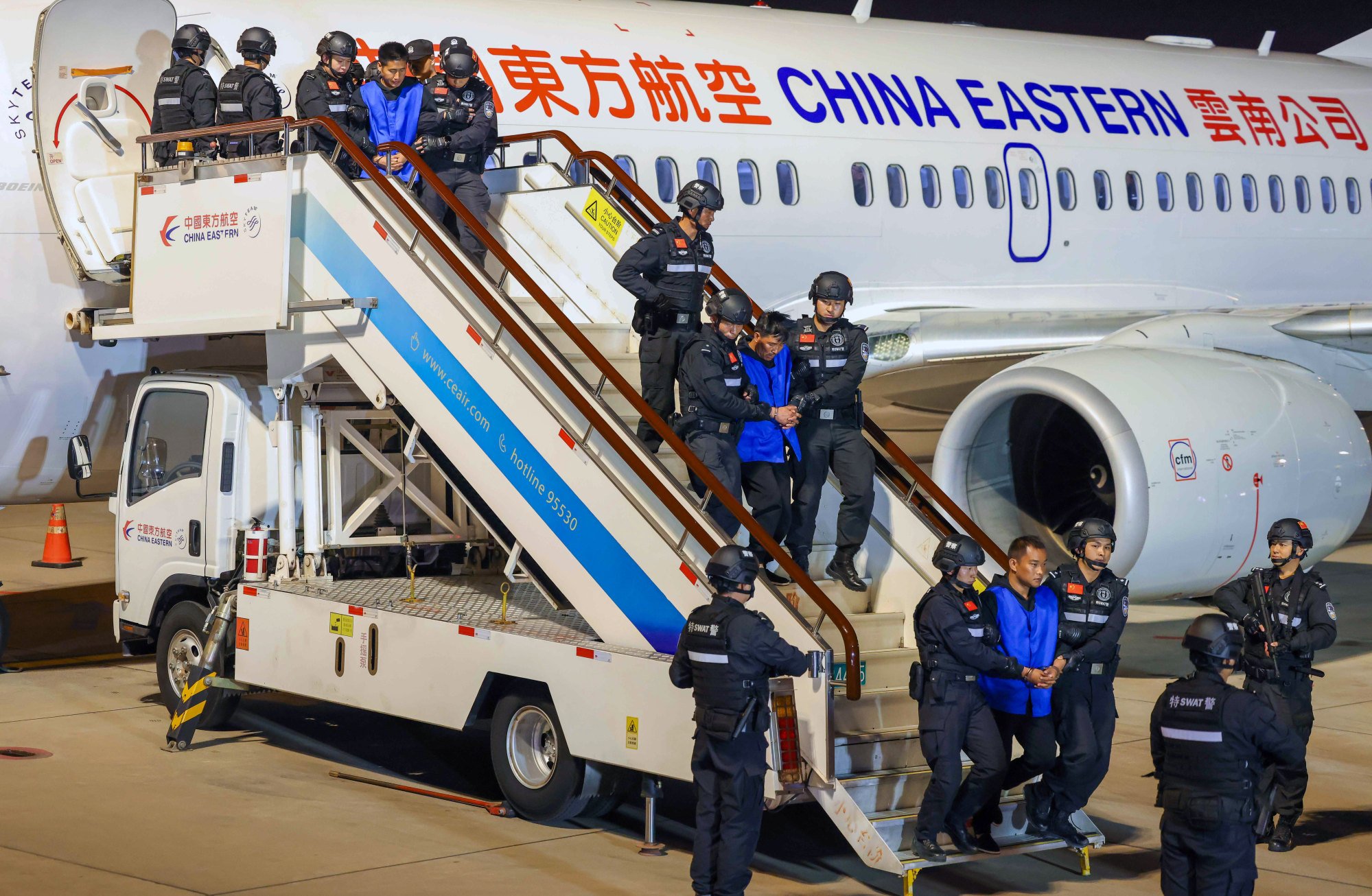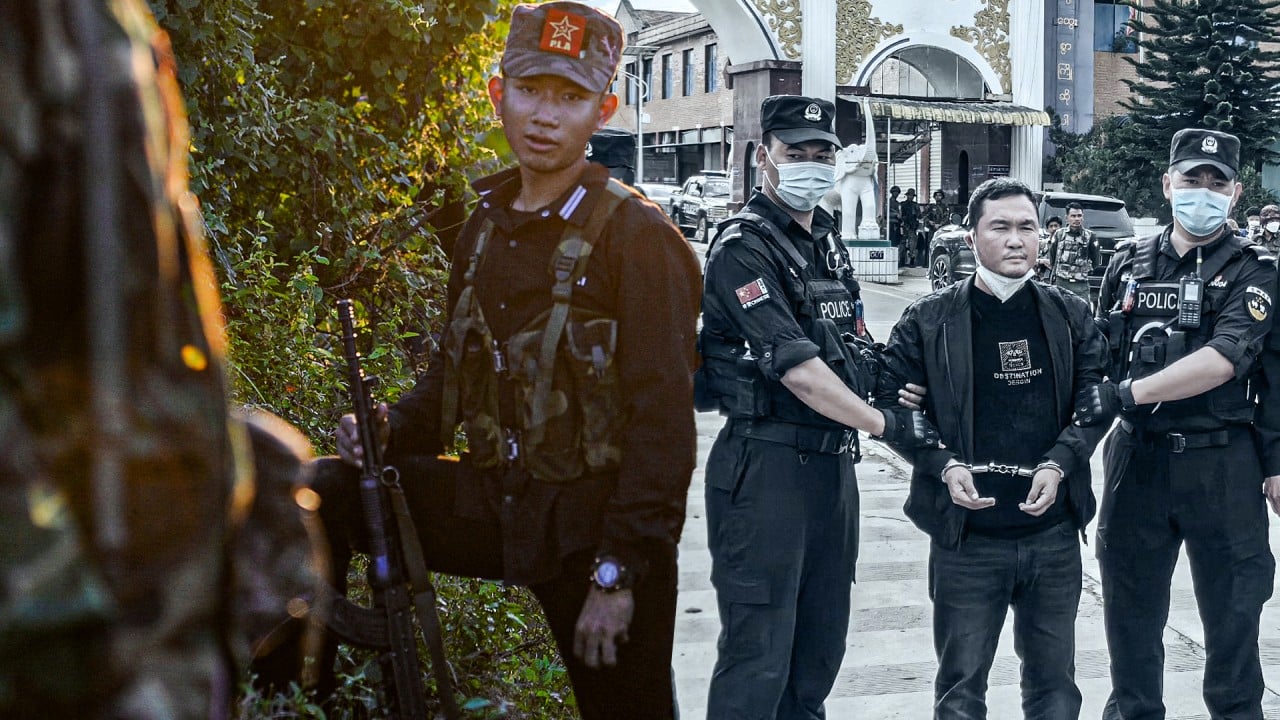
China plays peacemaker in Myanmar but high expectations, ‘trust issues’ and belt and road projects thwart progress
- Beijing is ‘only viable peacemaker’ in conflict between junta and rebel groups, but ‘zero-sum’ thinking makes lasting truce unlikely, analyst says
- Infrastructure investments, cybercrime and speculation in Naypyidaw about Beijing’s position complicate ceasefire talks
Three years after it seized power, Myanmar’s military junta faces a huge challenge as ethnic insurgent groups rebel across the country.
Observers say Beijing is likely to continue using its influence to seek a permanent ceasefire because it sees stability as a priority, but the divergent interests of the parties could complicate these efforts.
China brokers Myanmar truce, calls for ‘maximum restraint’ from junta, rebels
Zhou Shixin, a Southeast Asia specialist at the Shanghai Institutes for International Studies, said the fact that China had been able to broker a ceasefire during talks in Yunnan last month indicated the warring sides were willing to talk, but the truces were short-lived and fragile given the volatile situation.
“The window for peace is very short, and the window for maintaining peace is also very short, so we have seen that a breakout quickly occurred after the temporary reconciliation,” he said.
Zhou said the temporary reconciliation reached during the Yunnan talks meant the parties “basically had few additional demands”, and therefore tensions were likely to ease further.
“So I think breakouts in the future will be regional or sporadic and these breakouts may be limited in scope.”
According to Zhou, Beijing has “great patience and sincerity” in helping Myanmar to restore peace, but it is under pressure as both the junta and armed groups have high expectations for China’s role in the process.
Dan Seng Lawn, executive director of the Myanmar-based Kachinland Research Centre (KRC), said that while both the junta and the rebels saw China as the only viable peacemaker, Beijing could not meet the demands of the two sides.
“China cannot really dictate the outcome of the negotiations,” he said, adding that no outside power could meet the parties’ expectations at the moment because both sides were in a “zero-sum game” mindset.
He added that it would be difficult for the rebels to accept a permanent ceasefire agreement with the junta because of public opinion, “and if they stop fighting now and start talking with the [military government], they will have a lot to answer to the people”.
China’s trade with Myanmar has suffered since the rebels began their attacks in October. China is Myanmar’s biggest trading partner and its key investor.
Meanwhile, the Three Brotherhood Alliance has vowed to protect China’s assets during the conflicts in a bid to win Beijing’s trust.
“Understandings between the ethnic armed organisations and the Chinese government have meant that such projects have not been targeted to date,” she said.
Zhuang Guotu, a Xiamen University professor specialising in Southeast Asia, said while prolonged conflict would have an impact on China’s border security and long-term cooperation with Myanmar, it did not mean Beijing would have to pick sides for the sake of its infrastructure projects.
“I believe that only a fair solution to the Myanmar issue will benefit China’s belt and road projects in the long run,” he added.
China and Myanmar vow to maintain border security as rebels claim victory
Many in Naypyidaw have speculated that Beijing has backed the rebel groups’ offensives. Pro-junta media and supporters staged rallies against China, accusing Beijing of supporting the rebels, according to news site The Irrawaddy.
Beijing has repeatedly said it would not interfere in Myanmar’s internal affairs. In response to the pro-junta rallies, the Chinese foreign ministry said any actions attempting to undermine the friendship between China and Myanmar “will not succeed”.
Observers noted there may be some trust issues between China and the junta over the latter’s inaction in fighting cross-border fraud targeting Chinese citizens. Hundreds of thousands of Chinese are believed to have been lured to Myanmar by the promise of high-paying jobs but were instead held hostage and forced to work in operation centres.
Chinese officials have made several trips to Myanmar over the last year, calling on Naypyidaw to work with Beijing to crack down on cybercrime.
But Fink said that while the Chinese government would appreciate the junta’s gesture, it was “unlikely to change its overall assessment that the current military government is doing a poor job of running the country”.
“China is unhappy with [junta leader] Min Aung Hlaing’s leadership,” she said. “Members of Myanmar’s parallel National Unity Government (NUG), formed by politicians elected in 2020, are seeking to convince China to trust them.”
In a position paper last month, the NUG, Myanmar’s shadow government composed of elected lawmakers ousted in the 2021 coup, proposed protecting Chinese investments in the country and working with Beijing on cross-border crime while supporting the “one China” principle.
The NUG-backed People’s Defence Forces have also cooperated with the Three Brotherhood Alliance on local attacks against the junta.

Amara Thiha, a doctoral researcher specialising in Myanmar issues at the Peace Research Institute Oslo, said while the junta’s forces suffered from low morale, “a total collapse” was unlikely.
“Should the current situation persist, we may see the emergence of ‘rump states’ over a few years, characterised by decentralised authorities and varied attempts at secession,” Thiha said.
“This fragmentation likely deviates from what China would prefer. Indeed, there is a perception of a Chinese strategy akin to ‘watching the fire burn from across the river’, with some stakeholders suggesting that China is following this approach.”
He noted that China’s investments in the China-Myanmar Economic Corridor, which includes the deep port project, signified a level of commitment, showing Beijing was likely to continue supporting the “central de facto administrations in Myanmar”.
Last week, Chinese Foreign Minister Wang Yi and US national security adviser Jake Sullivan met in Thailand for a new round of talks on US-China relations. The pair also discussed Myanmar and agreed to hold follow-up meetings to discuss the conflict in the country.
China demands border security guarantee from Myanmar as rebels gain ground
But Thiha said the prospect of US-China cooperation was low.
“For China, involving the US in discussions on Myanmar could be seen as an expansion of US power. The strained China-US relationship further complicates this possibility,” he said.
Dan Seng Lawn said he did not think any “Western power” could play a role in Myanmar’s peace process at the moment, and the best thing the US and China could do was to reach a mutual understanding to bring Myanmar back to the “2011 scenario”.
In 2011, the junta, which had ruled the country for decades, started a series of democratic reforms, beginning a transition to civilian leadership.
“If possible, that’s the best case scenario at the moment,” Dan Seng Lawn said. “You open up for the civilian leadership, you open up to the West … But that too is really difficult now.”

 - Kawala Xie.jpg?itok=NogZcyZ-&v=1661304068)

